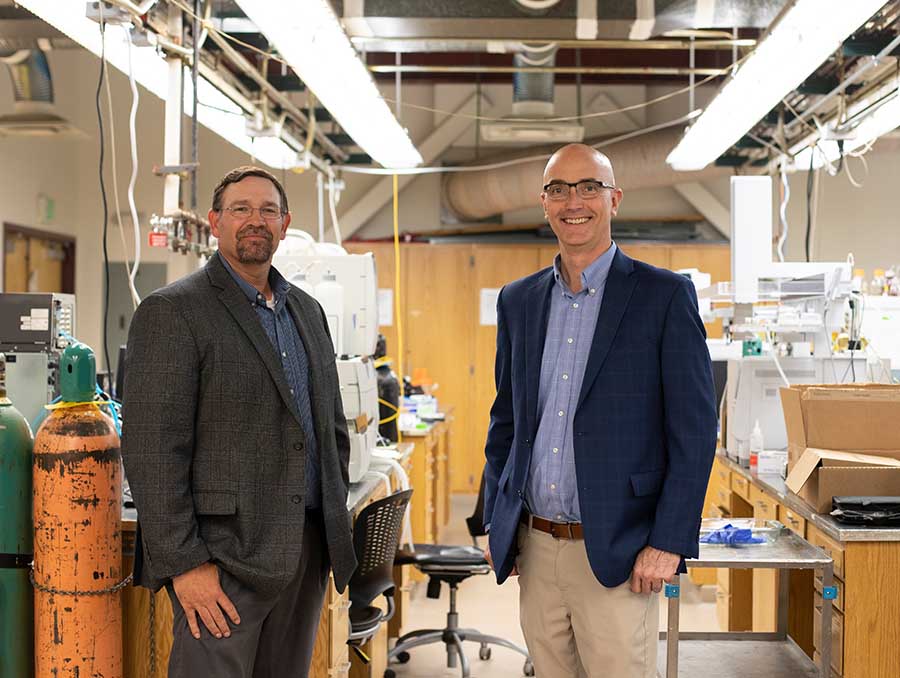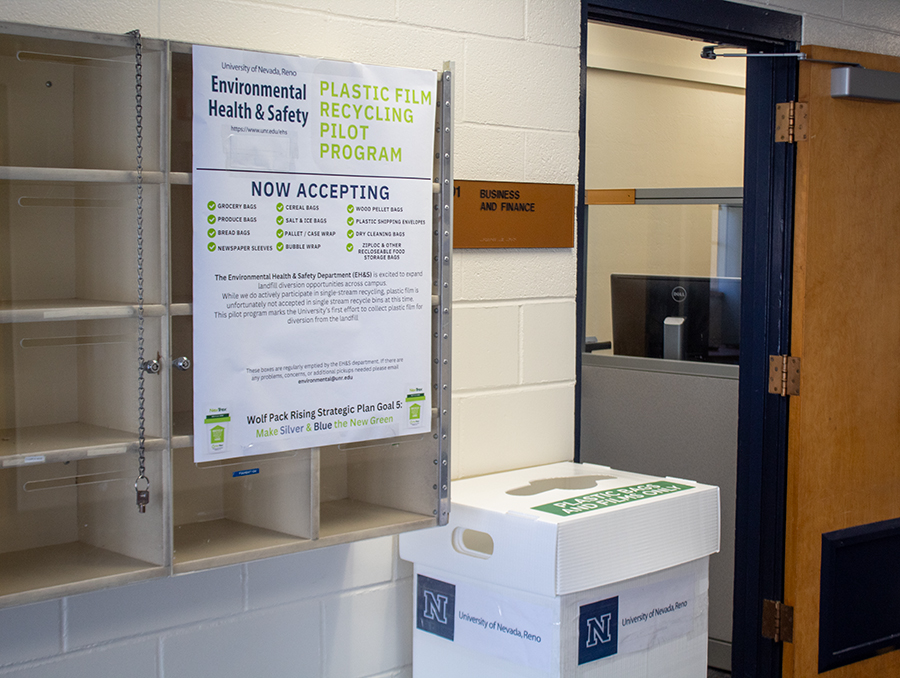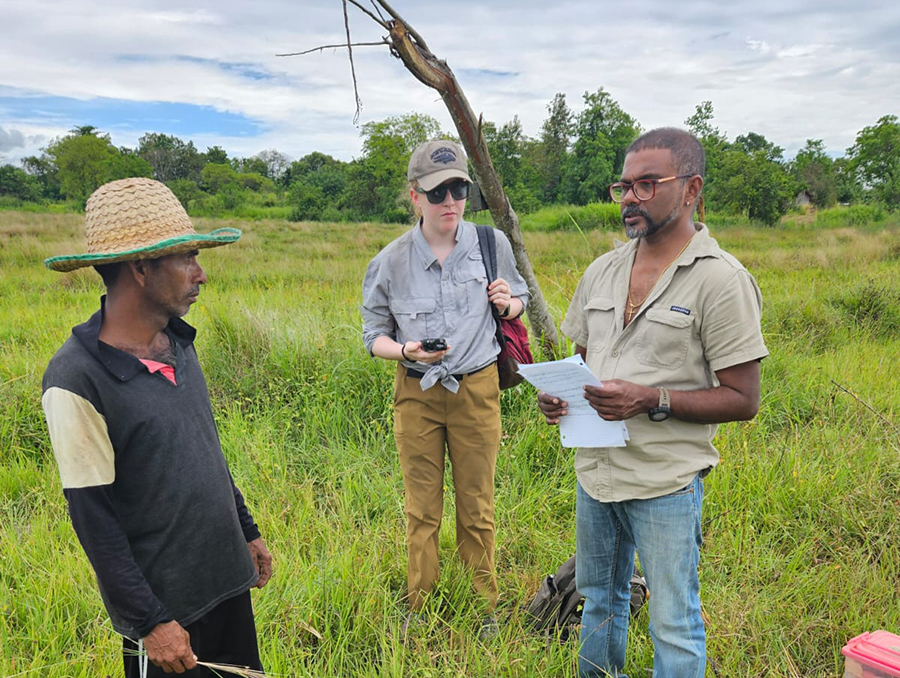The College of Engineering has received a $4 million grant from the U.S. Army Engineer Research and Development Center to establish the Nevada Center for Water Resiliency, with the possibility of additional funds for subsequent research. The new center will research and test new technologies in water treatment, focusing on potable water (drinking water) reuse from a variety of water sources.
Led by Chemical & Materials Engineering Associate Professor Sage Hiibel and Civil & Environmental Engineering Associate Professor Eric Marchand, the center is the latest step in a longtime effort by the professors and their colleagues to find solutions for water-scarce communities. And Nevada — located in the heart of the arid American West — is the right place to develop new water reuse technologies, the professors say.
“As the driest state in the nation and one of the top 10 fastest-growing states, water resources in Nevada are stretched thin,” the professors wrote in their grant proposal Water Resiliency and Self Sufficiency: Advanced Technologies and Systems for Water Reuse. “As a result, communities in Nevada are eager to find novel ways to diversify the state’s water portfolio, and are at the forefront of water conservation and reuse strategies.”
The new center will organize under the University’s already existing Nevada Water Innovation Institute. Its research projects fall into four areas: advanced water reuse technologies, emerging contaminants, alternative water sources and resource recovery. In addition to Hiibel and Marchand, Engineering faculty involved in the center are Keith Dennett, David Hanigan, Rashed Khan, Krishna Pagilla and Victor Vasquez.
National implications
While the primary focus of the new center is to increase water resiliency of municipal water systems, a key secondary benefit has national implications. Because potable reuse of reclaimed water is not regulated at the federal level, there is no federal standard governing water reuse activities, creating challenges for U.S. forces and federal agencies as well as regional governing organizations. Hiibel and Marchand propose that the center will facilitate communication between those stakeholders, including the Department of Defense, which oversees civilian works and military installations; the Environmental Protection Agency, which regulates drinking water; and the Department of Energy, which oversees water use for energy purposes.
Bridging that communication gap ultimately could lead to new water-reuse technologies and approaches that can be transitioned to real-world applications at a faster pace, according to Hiibel and Marchand.
“With this new center, Nevada is positioned to become a regional and national leader in water reuse technologies,” Engineering Dean Erick Jones said. “Congratulations to Dr. Hiibel and Dr. Marchand on this achievement, which will work to address one of the most pressing issues of our time — water scarcity.”
The new center aligns with one of the College of Engineering’s research pillars: equitable infrastructure, mitigating natural hazards, including water issues.
Federal, regional efforts to tackle water issues
Multimillion grants to establish research centers aren’t won overnight: Hiibel, Marchand and their colleagues have been working for about a decade toward this latest development.
It started with a 2012 project, A Fully Integrated Membrane Bioreactor System for Wastewater Treatment in Remote Applications, funded through the Department of Defense (DOD) and completed in 2018. The team followed up with a second DOD-funded project, “Portable Water Reuse System Driven by Waste Heat,” in 2018 that currently is wrapping up.
Along the way, the Water Reuse Consortium — comprised of Hiibel and Marchand in Nevada and their colleagues Dr. Andrea Achilli at the University of Arizona and Dr. Amy Childress at the University of Southern California — was organized and began its own integrated research on water issues. All three consortium partners applied for and received grants from the U.S. Army.
“Our military collaborators have seen how well we’ve done with the previous projects, so they are excited to build on that work with the consortium,” Hiibel said.
Although each university in the consortium is working on different types of water issues, Hiibel and Marchand expect to benefit and to contribute to shared information and data.
“We still have the same challenges around water,” Hiibel said. “It’s very, very important to come up with new ideas and new ways to increase our water supply,” he added.
The road ahead
Hiibel and Marchand’s proposal to the U.S. Army was divided into three phases, with a total proposed budget of $10 million over four years. The recently awarded $4 million covers the first phase — establishment of the new center and related research — which began in late May and will continue for the next 18 months.
If funded, Phases 2 and 3 will continue the current efforts and expand the research projects to be completed. But in addition to the current research, Hiibel and Marchand plan to increase the center’s scope of work by applying for additional funding from such organizations as the National Alliance for Water Innovation.
“We hope that we can build an infrastructure for Nevada to be a player on the national stage when it comes to these water reuse technologies,” Hiibel said.















